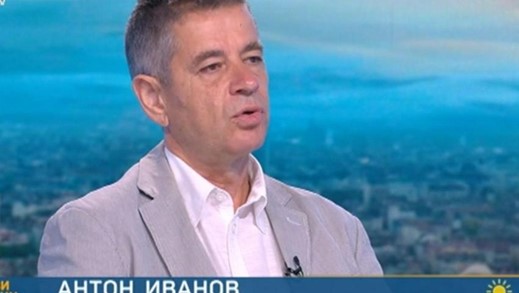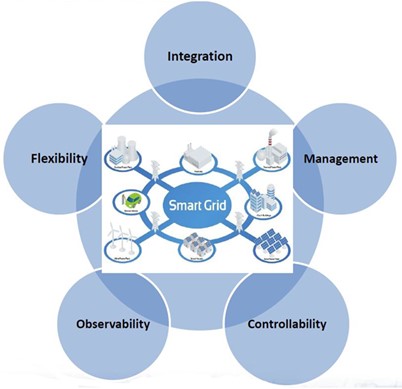STRIDE - Interview with Anton Ivanov of Bulgarian Energy and Mining Forum
17-10-2022
In September 2022, Mr. Anton Ivanov, Engineer and Deputy Chairman of the Bulgarian Energy and Mining Forum (BEMF), was interviewed by editors of the ‘Energy, Ecology, Economy’ platform. The BEMF is a pioneer in development of strategies for integration of smart grids at the municipal level and are a partner in the STRIDE project.

Q: Mr. Ivanov, you are Project Manager of the Bulgarian team in the Danube Transnational Programme STRIDE project. Smart Grid Strategies were developed during the project implementation. Could you share with us what the main characteristics of the "smart grids" are?
A: The concepts for development of the electricity supply have evolved in recent years from a centralised system for generation-transmission-distribution-consumption to various possibilities for generation close to consumption, or concepts for the increasingly applied decentralised systems. The transition to more diverse technological solutions for consumers is carried out mainly by modernisation of the supply and management systems of the low-voltage networks.
The combination of databases, demand side management systems and systems for decentralised energy production collectively shape what are now "smart grids". Typical examples are the electric vehicles’ charging systems, which can also be used as accumulators for electric energy for peak demands.
In recent years, smart grids have been very high on the EU’s agenda. The development of new technologies allowed specific and diverse system solutions regarding the smart grids. This has increasingly shaped the future development of the energy system. Smart grid concepts cover many areas – from planning, operation and maintenance of the network to generation, transmission, distribution and end-use.
The available network infrastructure has insufficient share of smart electricity meters to report consumption data. The share of RES is still low. These circumstances limit and hinder the application of concepts for decentralised systems. However, the latter are becoming more relevant with regard to the prices fluctuation at the free market, and with a view to the latest European policies for a low-carbon economy, which are accompanied by incentives.
The development of concepts for decentralised systems is associated with the application of models of energy cooperatives or communities for renewable energy. European legislation in this direction is in place. Related national legislation was developed by the BEMF and experts of the newly established Chamber of Energy Communities in Bulgaria.
 Schematic presentation of the "Smart Grid" concept
Schematic presentation of the "Smart Grid" concept
Q: Who are the main partners for implementation of the innovative concepts?
A: It should be noted that Bulgaria still lacks ready-to-use business models for energy cooperation, as they are yet at development phase. In other EU countries, such as Greece and Cyprus, which are geographically close to Bulgaria, cooperatives have already been established and are successfully operating. For example, in Greece, as of the summer of 2022, there are over 900 cooperatives, and there are already 5 in Cyprus. Project experience and conducted research indicates that during the establishment of an energy cooperative, a key and leading role plays the so-called “initiator of cooperation”, i.e. the [partner or organisation] that is attracting partners to build the partnership.
For example, during the STRIDE project implementation, in which BEMF is a partner, a wide range of practices were analysed across eight countries by the respective partners. Part of the project is the knowledge transfer and development of planning tools, with the overall goal of providing comprehensive support to local/regional communities to improve energy planning. The main objectives of this Danube Transnational Programme STRIDE project include development of regional analyses, action plans, strategies and other tools (i.e., methodologies, STRIDE guidebook, digital platform) that will enable and accelerate the integration of concepts for smart grids in local and regional policies throughout the Danube region.
As a result of the discussed practices, it was concluded that often the "initiator of cooperation" is driven by goals beyond commercial profit, and that often the initiator’s strategy includes support for new RES projects, support for application of innovative technologies, solving of social issues and others. This is the reason why in most cases the local authorities/municipalities play a leading role in energy cooperatives. In such cases, the specific roles of the municipalities include:
- Financing or guaranteeing new projects;
- Creation of a favourable environment, such as requiring investors to set goals for civic participation in projects;
- Assuring access to information;
- Launching of public tenders for purchase of energy produced by the community;
- Membership in the cooperative;
- Provision of administrative assistance and other non-financial resources for citizens.
In order to achieve these ambitious goals, it is necessary to have municipalities cooperating for identification and implementation of specific solutions at the local level. In November 2022, BEMF will organise a thematic seminar to present the results of the STRIDE project and to inform the energy community in Bulgaria about the perspectives and applicable tools for successful development of smart grids.
Click here for the full interview with Anton Ivanov published on the "Energy, Ecology, Economy" platform, only available in the Bulgarian language.
Key words and tags related to the article:
STRIDE in the media EU project STRIDE Investments Smart Grids
Facebook @StrideDTP
Twitter @ProjectStride
Web dtp.interreg-danube.eu/
